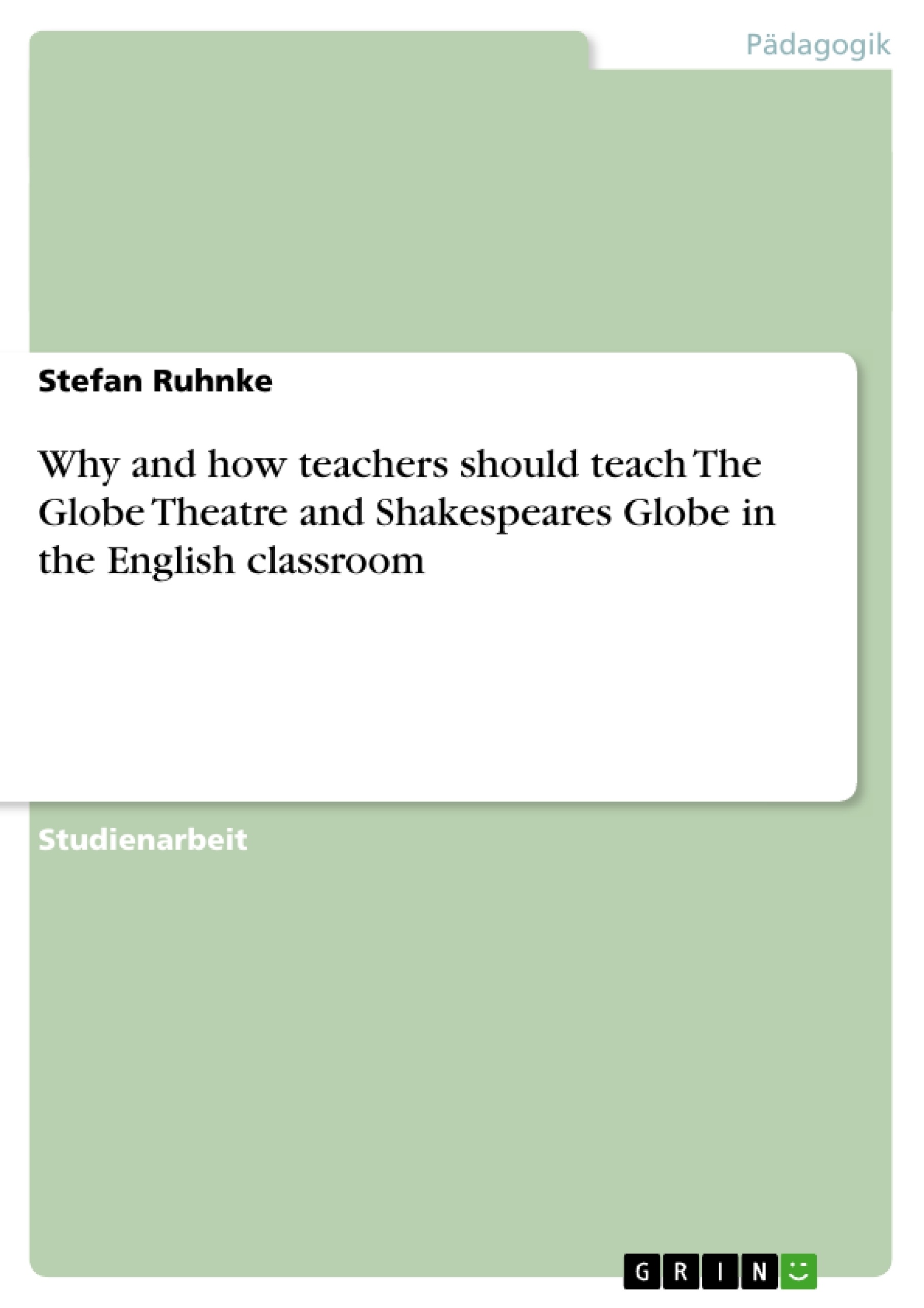In this seminar paper I want to discuss why and how The Globe as the best example for an Elizabethan theatre – or playhouse, as it would have been called in Shakespeare’s days – and Shakespeare’s Globe as a modern copy of The Globe should be included in a Shakespeare course aimed at German Sekundarstufe II students of English at a Gymnasium or at an Integrierte Gesamtschule.
I will also attach some material that can be used for the purpose of teaching students about The Globe to the seminar paper. I designed some of it myself, but also found some useful material on the internet. Since a seminar paper only offers limited space to discuss ideas in an exemplary manner I can not comment on all attached material, although every attached material offers different ways to use it for the topic.
Before I start discussing why the theatre topic should be an essential part of any Shakespeare course and how it could be done, I have to mention that despite a seemingly endless number of books on Shakespeare, his times and literature focussing on teaching Shakespeare, there are only a very small number of publications featuring suggestions and ideas on teaching students about The Globe and Shakespeare’s Globe.
Inhaltsverzeichnis
- Introduction
- Why should students learn something about The Globe Theatre and Shakespeare's Globe in courses on Shakespeare and his plays?
- A teacher's task: Planning lessons on The Globe and Shakespeare's Globe and organizing material
- Ideas on how to start teaching the topic
- Using the movie "Shakespeare in Love" for teaching the theatre topic
- Some more ideas on how to teach The Globe and Shakespeare's Globe
- Conclusion
Zielsetzung und Themenschwerpunkte
Diese Seminararbeit beschäftigt sich mit der Bedeutung des Globe Theaters und des Shakespeare's Globe für den Englischunterricht in der Sekundarstufe II. Sie untersucht, warum und wie diese Themen in den Unterricht integriert werden sollten, um das Verständnis für Shakespeare und seine Werke zu vertiefen.
- Die Bedeutung des Globe Theaters im Kontext von Shakespeare's Leben und Werk
- Die Bedeutung des Globe Theaters für das Verständnis der Shakespeare'schen Dramen
- Methoden und Materialien für die Integration des Globe Theaters in den Unterricht
- Die Verwendung von Filmen wie "Shakespeare in Love" im Unterricht
- Die Rolle des modernen Shakespeare's Globe als Lernort
Zusammenfassung der Kapitel
- Introduction: Die Arbeit argumentiert, dass die Lehre von Shakespeare und seinen Werken über die bloße Analyse der Dramen hinausgehen sollte und die Einbeziehung des Globe Theaters als wichtigen Kontext für das Verständnis der Werke erfordert.
- Why should students learn something about The Globe Theatre and Shakespeare's Globe in courses on Shakespeare and his plays?: Die Arbeit unterstreicht die Bedeutung des Globe Theaters als Kontext für Shakespeare's Leben und Werk, sowie für das Verständnis der Dramen. Sie betont auch die Motivation, die der Unterricht über das Globe Theater für Schüler bieten kann.
- A teacher's task: Planning lessons on The Globe and Shakespeare's Globe and organizing material: Dieser Abschnitt konzentriert sich auf die praktische Umsetzung des Themas im Unterricht und bietet konkrete Ideen für die Planung von Unterrichtsstunden und die Organisation von Materialien.
- Ideas on how to start teaching the topic: Dieser Abschnitt präsentiert verschiedene Ansätze, um das Thema Globe Theater im Unterricht einzuführen und die Schüler für die Thematik zu begeistern.
- Using the movie "Shakespeare in Love" for teaching the theatre topic: Dieser Abschnitt untersucht die Möglichkeiten, den Film "Shakespeare in Love" als didaktisches Mittel im Unterricht einzusetzen, um die Schüler an das Thema heranzuführen.
- Some more ideas on how to teach The Globe and Shakespeare's Globe: Dieser Abschnitt bietet weitere Ideen und Vorschläge für die Gestaltung von Unterrichtseinheiten zum Globe Theater.
Schlüsselwörter
Die Arbeit befasst sich mit den Themen Shakespeare, Globe Theater, Elizabethan Theatre, Shakespeare's Globe, Unterricht, Sekundarstufe II, Englischunterricht, Didaktik, Methoden, Materialien, "Shakespeare in Love".
- Citation du texte
- Stefan Ruhnke (Auteur), 2005, Why and how teachers should teach The Globe Theatre and Shakespeares Globe in the English classroom, Munich, GRIN Verlag, https://www.grin.com/document/74340



